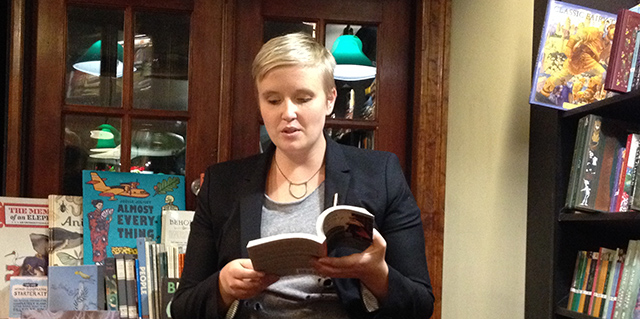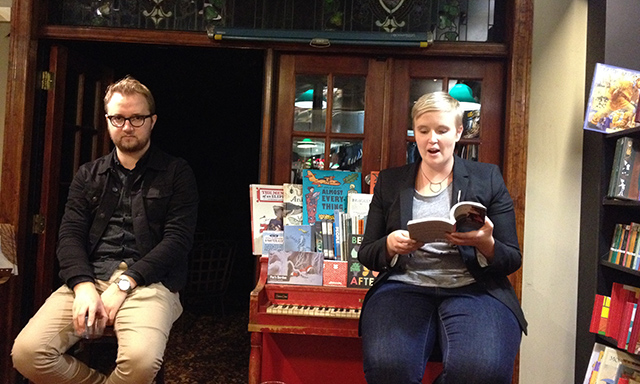
Jac Jemc read from the collection of very short stories, A Different Bed Every Time at Community Bookstore at an event sponsored by Volume 1 Brooklyn. She was joined by Sasha Fletcher.
Jemc’s book is filled with stories of loneliness. They tend to face horrors or unhappy ends, though often accepting these events fatalistically. These are very short stories too, few being longer than a few pages. The collection’s order is the result of meticulous arrangement. “I thought in terms of what things are similar and what things are different.” Jemc mixed plot driven stories around with the denser ones in the hope of preventing clusters that were too similar.
Ideally she wanted she wanted to mix the stronger stories throughout the collection, though this goal presented its own challenges. “Different people think different stories are stronger than I do,” Jemc says.
The characters often have a strange ambivalence. Fletcher points out that many of the narrators go almost as far as inviting the horror on themselves.

“The characters know something terrible is going to happen, so they might as well call it,” Jemc says. Her creations embrace their fates. She adds that its the same sort of way she faces her own life. Even when bad things happen she at last enjoys the “I told you so” moments that come from that embrace. She says that she doesn’t really enjoy herself unless she anticipates the event. The act of anticipation is where she derives joy.
“Its so hard to write about happiness,” she says.”Its never going to be interesting to read about it.” Without the tragedy, the action that drives narrative isn’t available to the writer, and readers won’t find anything of interest.
“I’m not anti-happiness in real life,” she adds before anyone can accuse her of it. It seems defensive, as though she’s expected to be a depressive person.
Even if Jemc is somewhat more upbeat than the characters she has created, that wasn’t always the case. “I think there was a time in my life when I was obsessed with my own misery,” she says.
Process plays a major role in shaping Jemc’s stories. She begins by looking at other writing and picking out words and phonetics that she likes, crafting phrases and sentences from these found words. She chooses the words she likes rather than selecting words based on meaning. “Thats the way I trick myself into writing,” she says. These constructed phrases become building blocks that form the foundation of the stories.
Plot is less important to her stories at the point of creation than the words themselves. They are chosen because Jemc likes them or likes how they feel together. She doesn’t know what kind of story she is trying to write when she starts, and she doesn’t think of her stories as traditionally plotted. One trick she employs is simply cutting the first paragraph after its written.
Currently, Jemc is working on a novel. “I’ve always liked ghost stories and spooky stuff,” she says.